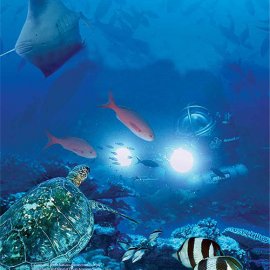Ocean Literacy: An Introduction
-
English
-
ListenPause
[intro music] Welcome to World Ocean Radio… I’m Peter Neill, Director of the World Ocean Observatory. We think of ourselves as literate people. We put full value on education, our ability to read and write, to analyze and distill from history as experience, archive, memoir, and material things toward a more complete understanding of where we live, how we live, and what we live for. We are social beings; our stories are narratives of human interactions, among ourselves over time and with Nature as source of substance and sustenance for what we call civilization. To know is to observe, to organize our observations, and to apply that knowledge as invention, exchange, and communication. This latter is so important. Are we truly knowledgeable if we are unable to communicate what we know? Literacy is functional communication, in the form of words, equations, visualizations, and songs. We are literate when all our senses are applied as interpretive response to the course of human events. Key to that response is engagement with the natural world. And the ocean represents 71% of that world in its most literal iteration. We cultivate the surface layers of the land – as agriculture, manufacture, extraction, and settlement. We claim to know a lot about that scape, but not enough to protect it from the consequence of our exploitation. As a result, the land approaches exhaustion, not so much a garden as a refuge, not so much a place for abundance as a wasteland of our irresponsible consumption. We approach a point when we must not tolerate the perpetuation of this situation – the values, structures, and behaviors that clearly inhibit the probability of survival. This may seem melodramatic to say, but I don’t think so. As we face the consequence of our history, we are faced with choice. What will it take to redress and reverse the vectors of decline? What will it take to address and advance the vectors of change? The odds are high, and long. Literate people, the world over, must now, soon, apply their knowledge, their understanding, and their energy toward plausible scenarios for alternative futures. That future, in our view, depends on the ocean. The subject then, of an ensuing series is OCEAN LITERACY– an anthology of reflections, examples, illustrations, and demonstrations that represent the best responses to the challenges we face. The work we describe here is based on the efforts of a group of ocean experts and educators to outline a curriculum intended to instill inside and outside formal classrooms a full understanding of what the ocean means for our living, for all aspects of the wellness and welfare of our selves and our communities. While the focus is on comprehensive ocean science, the curriculum transcends the usual natural resource perimeters of such study to relate the ocean to climate, fresh water, food, energy, health, work, trade, transportation, finance, community development, and cultural traditions. The essential principles of this ocean literacy curriculum are as follows: 1. The Earth has one big ocean with many features 2. The ocean and life in the ocean shape the features of Earth 3. The ocean is a major influence on weather and climate 4. The ocean made Earth habitable 5. The ocean supports a great diversity of life and ecosystems 6. The ocean and humans are inextricably interconnected 7. The ocean is largely unexplored These perspectives will serve as a framework for a catalogue of the most innovative ideas for our ocean future that we can find and present to you here. Taken together, we hope they will serve as a communication tool as we build together of global community of Citizens of the Ocean who will serve as agents for change and sustainability of the sea that connects all things. We will discuss these issues, and more, in future editions of World Ocean Radio. [outro music]
This week's episode of World Ocean Radio kicks off a multi-part series on the Ocean Literacy Principles. The next eight episodes will provide an anthology of reflections, examples and illustrations that represent responses to the ocean and the environmental challenges we face. We will focus not only on ocean science and the ways that the Ocean Literacy curriculum aligns with the current educational system in the United States, but also on the ways that ocean relates to climate, fresh water, food, energy, health, work, trade, transportation and much more.
About World Ocean Radio
Peter Neill, Director of the World Ocean Observatory and host of World Ocean Radio, provides coverage of a broad spectrum of ocean issues from science and education to advocacy and exemplary projects. World Ocean Radio, a project of the World Ocean Observatory, is a weekly series of five-minute audio essays available for syndicated use at no cost by college and community radio stations worldwide. A selection of episodes is now available in Portuguese, Spanish, French, Swahili, and Mandarin, enabling us to reach 75% of the world's population. For more information, visit WorldOceanObservatory.org/world-ocean-radio-global.
Image
Ocean Literacy Curriculum
The Ocean Literacy Series
< 01: An Introduction
< 02: One Big Ocean
< 03: Ocean Shapes the Features of Earth
< 04: Weather and Climate
< 05: Ocean Makes Earth Habitable
< 06: Ocean Supports A Great Diversity of Life and Ecosystems
< 07: Ocean and Humans Are Inextricably Interconnected
< 08: The Ocean is Largely Unexplored
< 09: A Conclusion
- Login to post comments



